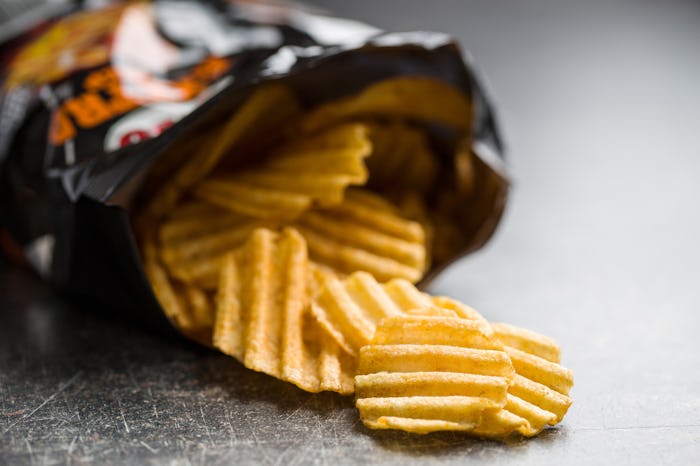Life

7 Small, Easy To Fix Habits That Make You Overeat
You know the healthy eating drill — load up on produce, lean proteins, whole grains, drink lots of water, limit fat and sugar intake. You strive for that but, honestly, it's hard to stick to it all the time. And even if you manage to stick to these eating habits, you may still partake in the small habits that make you overeat. Not only can these habits counteract all of your healthy habits, but it can keep you from feeling more energized, getting stronger, sleeping better, or whatever it is that you were hoping would result.
And it's not just about overeating the less than healthy foods. According to Women's Health, you can just as easily overeat healthy foods as you can with unhealthy foods. In some cases, overdoing it on the grub can be classified as compulsive overeating, or binge-eating disorder. But according to the National Institute of Mental Health (NIMH), binge-eating disorder's lifetime prevalence is 2.8 percent of the U.S. population. Even though you probably don't have a diagnosable condition, you may have picked up little habits here and there that are making you overeat. Recognizing these seven small, common habits and making changes will prevent you from unknowingly overeating as often.
1You Skip Meals
Although The New York Time noted that intermittent fasting can help rev up metabolism, generally, skipping meals can result in overeating later. It makes sense, right? According to Forbes, skipping meals makes you hungrier than normal later, which may result in overeating. Eating something, even something relatively small such as an apple or cup of yogurt, can help keep your energy up and make sure that you're not quite so ravenous when you do get to eat later.
2You Continuously Snack
Although eating less more frequently is often touted as a healthy weight loss strategy, Self noted that endless, mindless snacking isn't the way to go. Often, those who continuously snack are eating out of boredom or because the food is sitting right there, not because they're truly hungry. In doing so, you may end up eating way more over the course of the day than you had planned (or would have if the food wasn't so readily available).
3You're A Fast Eater
I eat way too fast and have since high school when we didn't have much time for lunch. Unfortunately the habit stuck. The problem with eating quickly, according to Everyday Health, is that your brain doesn't recognize that you're full until about 20 minutes after you've eaten. If you're eating quite quickly, you may eat too much before your brain even recognizes what's going on. Putting down your fork (or spoon, whatever) in between bites can help slow you down.
4You Don't Drink Enough Water
According to Boston College's administrative dietitian for B.C. Dining, two-thirds of Americans don't drink enough water, which is problematic for a number of reasons. But, as dietician Brigitte Zeitlin told Self, sometimes what you think is a hunger pang is actually a call for hydration. If you eat every time you feel the slightest hunger pang, you might accidentally and unknowingly overeat. Make sure you drink water more regularly, or consider picking up a glass before making yourself a snack to help quit this habit.
5You Use A Big Plate
A plate's a plate, right? Not to much. It turns out, eating off a large plate can cause you to overeat, according to a study conducted by researchers at the University of Cambridge in the U.K. Swapping to a smaller-sized plate (as well as smaller utensils) can save you over 500 calories a day.
6You Eat Your Kid's Leftovers
I don't even have kids, but I've been guilty of this as a babysitter. According to TIME, however, grazing off your kid's plate can really add up, calorie-wise. And if you're eating normal meals (which you probably should be) in addition to a bite here and a bite there of whatever your kiddos are eating, it's easy to overeat and not even know it.
7You Eat Late At Night
You've eaten dinner, cleaned up, and settled down to relax for the night, when a few hours later you're back in front of the refrigerator searching for a snack. But if you've already eaten well during the day, anything you eat late at night (which could actually be due to boredom or exhaustion rather than hunger) is an add-on. Ashley M. Lytwyn, a registered dietitian and director of nutrition at Breathe Life Healing Centers, told Self, that if you do need to eat a small snack before bed, balancing a fruit with a healthy fat or a protein with a vegetable can help keep things from spiraling out of control.